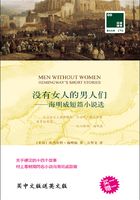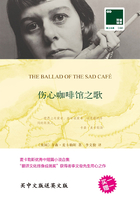With the size and furniture of the house Mrs. Dashwood was upon the whole well satisfied; for though her former style of life rendered many additions to the latter indispensable, yet to add and improve was a delight to her; and she had at this time ready money enough to supply all that was wanted of greater elegance to the apartments. "As for the house itself, to be sure," she said, "it is too small for our family, but we will make ourselves tolerably comfortable for the present as it is too late in the year for improvements. Perhaps in the spring if I have plenty of money, as I dare say I shall, we may think about building. These parlours are both too small for such parties of our friends as I hope to see often collected here; and I have some thoughts of throwing the passage into one of them with perhaps a part of the other, and so leave the remainder of that other for an entrance; this, with a new drawing-room which may be easily added, and a bedchamber and garret above, will make it a very snug little cottage. I could wish the stairs were handsome. But one must not expect everything, though, I suppose it would be no difficult matter to widen them. I shall see how much I am beforehand with the world in the spring, and we will plan our improvements accordingly."
In the meantime, till all these alterations could be made from the savings of an income of five hundred a year by a woman who never saved in her life, they were wise enough to be contented with the house as it was; and each of them was busy in arranging their particular concerns, and endeavouring, by placing around them their books and other possessions, to form themselves a home. Marianne's pianoforte was unpacked and properly disposed of, and Elinor's drawings were affixed to the walls of their sitting room.
In such employments as these they were interrupted soon after breakfast the next day by the entrance of their landlord, who called to welcome them to Barton, and to offer them every accommodation from his own house and garden in which theirs might at present be deficient. Sir John Middleton was a good looking man about forty. He had formerly visited at Stanhill, but it was too long ago for his young cousins to remember him. His countenance was thoroughly good-humoured;and his manners were as friendly as the style of his letter. Their arrival seemed to afford him real satisfaction, and their comfort to be an object of real solicitude to him. He said much of his earnest desire of their living in the most sociable terms with his family, and pressed them so cordially to dine at Barton Park every-day till they were better settled at home, that, though his entreaties were carried to a point of perseverance beyond civility, they could not give offence. His kindness was not confined to words; for within an hour after he left them, a large basket of garden stuff and fruit arrived from the park, which was followed before the end of the day by a present of game. He insisted moreover on conveying all their letters to and from the post for them, and would not be denied the satisfaction of sending them his newspaper every day.
Lady Middleton had sent a very civil message by him, denoting her intention of waiting on Mrs. Dashwood as soon as she could be assured that her visit would be no inconvenience; and as this message was answered by an invitation equally polite, her ladyship was introduced to them the next day.
They were of course very anxious to see a person on whom so much of their comfort at Barton must depend; and the elegance of her appearance was favourable to their wishes. Lady Middleton was not more than six or seven and twenty; her face was handsome, her figure tall and striking, and her address graceful. Her manners had all the elegance which her husband's wanted. But they would have been improved by some share of his frankness and warmth; and her visit was long enough to detract something from their first admiration, by showing that though perfectly well-bred, she was reserved, cold, and had nothing to say for herself beyond the most commonplace inquiry or remark.
Conversation however was not wanted, for Sir John was very chatty, and Lady Middleton had taken the wise precaution of bringing with her their eldest child, a fine little boy about six years old, by which means there was one subject always to be recurred to by the ladies in case of extremity, for they had to inquire his name and age, admire his beauty, and ask him questions which his mother answered for him while he hung about her and held down his head to the great surprise of her ladyship, who wondered at his being so shy before company as he could make noise enough at home. On every formal visit a child ought to be of the party, by way of provision for discourse. In the present case it took up ten minutes to determine whether the boy were most like his father or mother, and in what particular he resembled either, for of course everybody differed, and everybody was astonished at the opinion of the others.
An opportunity was soon to be given to the Dashwoods of debating on the rest of the children, as Sir John would not leave the house without securing their promise of dining at the park the next day.
Chapter 7
BARTON PARK WAS about half a mile from the cottage. The ladies had passed near it in their way along the valley, but it was screened from their view at home by the projection of the hill. The house was large and handsome; and the Middletons lived in a style of equal hospitality and elegance. The former was for Sir John's gratification, the latter for that of his lady. They were scarcely ever without some friends staying with them in the house, and they kept more company of every kind than any other family in the neighbourhood. It was necessary to the happiness of both; for however dissimilar in temper and outward behaviour, they strongly resembled each other in that total want of talent and taste which confined their employments, unconnected with such as society produced, within a very narrow compass. Sir John was a sportsman, Lady Middleton a mother. He hunted and shot, and she humoured her children; and these were their only resources. Lady Middleton had the advantage of being able to spoil her children all the year round, while Sir John's independent employments were in existence only half the time. Continual engagements at home and abroad, however, supplied all the deficiencies of nature and education, supported the good spirits of Sir John, and gave exercise to the good breeding of his wife.
Lady Middleton piqued herself upon the elegance of her table ,and of all her domestic arrangements; and from this kind of vanity was her greatest enjoyment in any of their parties. But Sir John's satisfaction in society was much more real; he delighted in collecting about him more young people than his house would hold, and the noisier they were, the better was he pleased. He was a blessing to all the juvenile part of the neighbourhood, for in summer he was forever forming parties to eat cold ham and chicken out-of-doors, and in winter his private balls were numerous enough for any young lady who was not suffering under the insatiable appetite of fifteen.
The arrival of a new family in the country was always a matter of joy to him, and in every point of view he was charmed with the inhabitants he had now procured for his cottage at Barton. The Miss Dashwoods were young, pretty, and unaffected. It was enough to secure his good opinion, for to be unaffected was all that a pretty girl could want to make her mind as captivating as her person. The friendliness of his disposition made him happy in accommodating those whose situation might be considered in comparison with the past as unfortunate. In showing kindness to his cousins, therefore, he had the real satisfaction of a good heart; and in settling a family of females only in his cottage, he had all the satisfaction of a sportsman; for a sportsman, though he esteems only those of his sex who are sportsmen likewise, is not often desirous of encouraging their taste by admitting them to a residence within his own manor.
Mrs. Dashwood and her daughters were met at the door of the house by Sir John, who welcomed them to Barton Park with unaffected sincerity; and as he attended them to the drawing room repeated to the young ladies the concern which the same subject had drawn from him the day before, at being unable to get any smart young men to meet them. They would see, he said, only one gentleman there besides himself, a particular friend who was staying at the park, but who was neither very young nor very gay. He hoped they would all excuse the smallness of the party and could assure them it should never happen so again. He had been to several families that morning in hopes of procuring some addition to their number, but it was moonlight and everybody was full of engagements. Luckily Lady Middleton's mother had arrived at Barton within the last hour, and as she was a very cheerful agreeable woman, he hoped the young ladies would not find it so very dull as they might imagine. The young ladies, as well as their mother, were perfectly satisfied with having two entire strangers of the party and wished for no more.
Mrs. Jennings, Lady Middleton's mother, was a good-humoured, merry, fat, elderly woman, who talked a great deal, seemed very happy and rather vulgar. She was full of jokes and laughter, and before dinner was over had said many witty things on the subject of lovers and husbands, hoped they had not left their hearts behind them in Sussex, and pretended to see them blush whether they did or not. Marianne was vexed at it for her sister's sake and turned her eyes towards Elinor to see how she bore these attacks, with an earnestness which gave Elinor far more pain than could arise from such commonplace raillery as Mrs. Jennings's.
Colonel Brandon, the friend of Sir John, seemed no more adapted by resemblance of manner to be his friend, than Lady Middleton was to be his wife, or Mrs. Jennings to be Lady Middleton's mother. He was silent and grave. His appearance however was not unpleasing, in spite of his being in the opinion of Marianne and Margaret an absolute old bachelor, for he was on the wrong side of five and thirty; but though his face was not handsome, his countenance was sensible, and his address was particularly gentlemanlike.
There was nothing in any of the party which could recommend them as companions to the Dashwoods; but the cold insipidity of Lady Middleton was so particularly repulsive, that in comparison of it the gravity of Colonel Brandon and even the boisterous mirth of Sir John and his mother-in-law was interesting. Lady Middleton seemed to be roused to enjoyment only by the entrance of her four noisy children after dinner, who pulled her about, tore her clothes, and put an end to every kind of discourse except what related to themselves.
In the evening, as Marianne was discovered to be musical, she was invited to play. The instrument was unlocked; everybody prepared to be charmed, and Marianne, who sang very well, at their request went through the chief of the songs which Lady Middleton had brought into the family on her marriage, and which perhaps had lain ever since in the same position on the pianoforte, for her ladyship had celebrated that event by giving up music, although by her mother's account she had played extremely well, and by her own was very fond of it.
Marianne's performance was highly applauded. Sir John was loud in his admiration at the end of every song and as loud in his conversation with the others while every song lasted. Lady Middleton frequently called him to order, wondered how anyone's attention could be diverted from music for a moment, and asked Marianne to sing a particular song which Marianne had just finished. Colonel Brandon alone, of all the party, heard her without being in raptures. He paid her only the compliment of attention; and she felt a respect for him on the occasion, which the others had reasonably forfeited by their shameless want of taste. His pleasure in music, though it amounted not to that ecstatic delight which alone could sympathize with her own, was estimable when contrasted against the horrible insensibility of the others; and she was reasonable enough to allow that a man of five and thirty might well have outlived all acuteness of feeling and every exquisite power of enjoyment. She was perfectly disposed to make every allowance for the colonel's advanced state of life which humanity required.
Chapter 8
MRS. JENNINGS WAS a widow with an ample jointure. She had only two daughters, both of whom she had lived to see respectably married, and she had now therefore nothing to do but to marry all the rest of the world. In the promotion of this object she was zealously active as far as her ability reached and missed no opportunity of projecting weddings among all the young people of her acquaintance. She was remarkably quick in the discovery of attachments, and had enjoyed the advantage of raising the blushes and the vanity of many a young lady by insinuations of her power over such a young man; and this kind of discernment enabled her soon after her arrival at Barton decisively to pronounce that Colonel Brandon was very much in love with Marianne Dashwood. She rather suspected it to be so on the very first evening of their being together, from his listening so attentively while she sang to them; and when the visit was returned by the Middletons' dining at the cottage, the fact was ascertained by his listening to her again. It must be so. She was perfectly convinced of it.it would be an excellent match,for he was rich and she was handsome.Mrs.Jennings had been anxious to see Colonel Brandon well married ever since her connection with Sir John first brought him to her knowledge; and she was always anxious to get a good husband for every pretty girl.
The immediate advantage to herself was by no means inconsiderable, for it supplied her with endless jokes against them both. At the park she laughed at the colonel, and in the cottage at Marianne. To the former her raillery was probably, as far as it regarded only himself, perfectly indifferent; but to the latter it was at first incomprehensible; and when its object was understood, she hardly knew whether most to laugh at its absurdity, or censure its impertinence, for she considered it as an unfeeling reflection on the colonel's advanced years and on his forlorn condition as an old bachelor.
Mrs. Dashwood, who could not think a man five years younger than herself so exceedingly ancient as he appeared to the youthful fancy of her daughter, ventured to clear Mrs. Jennings from the probability of wishing to throw ridicule on his age.
"But at least, mama, you cannot deny the absurdity of the accusation, though you may not think it intentionally ill-natured. Colonel Brandon is certainly younger than Mrs.Jennings,but he is old enough to be my father; and if he were ever animated enough to be in love, must have long outlived every sensation of the kind. It is too ridiculous! When is a man to be safe from such wit if age and infirmity will not protect him?"
"Infirmity!" said Elinor. "Do you call Colonel Brandon infirm? I can easily suppose that his age may appear much greater to you than to my mother, but you can hardly deceive yourself as to his having the use of his limbs!"
"Did not you hear him complain of the rheumatism? And is not that the commonest infirmity of declining life?"
"My dearest child," said her mother, laughing, "at this rate you must be in continual terror of my decay;and it must seem to you a miracle that my life has been extended to the advanced age of forty."
"Mama, you are not doing me justice. I know very well that Colonel Brandon is not old enough to make his friends yet apprehensive of losing him in the course of nature. He may live twenty years longer. But thirty-five has nothing to do with matrimony."
"Perhaps," said Elinor, "thirty-five and seventeen had better not have anything to do with matrimony together. But if there should by any chance happen to be a woman who is single at seven and twenty, I should not think Colonel Brandon's being thirty-five any objection to his marrying her."
"A woman of seven and twenty," said Marianne, after pausing a moment, "can never hope to feel or inspire affection again, and if her home be uncomfortable, or her fortune small, I can suppose that she might bring herself to submit to the offices of a nurse for the sake of the provision and security of a wife. In his marrying such a woman therefore there would be nothing unsuitable. It would be a compact of convenience, and the world would be satisfied. In my eyes it would be no marriage at all, but that would be nothing. To me it would seem only a commercial exchange in which each wished to be benefited at the expense of the other."
"It would be impossible, I know," replied Elinor, "to convince you that a woman of seven and twenty could feel for a man of thirty-five anything near enough to love to make him a desirable companion to her. But I must object to your dooming Colonel Brandon and his wife to the constant confinement of a sick chamber merely because he chanced to complain yesterday (a very cold damp day) of a slight rheumatic feel in one of his shoulders."
"But he talked of flannel waistcoats," said Marianne; "and with me a flannel waistcoat is invariably connected with aches, cramps, rheumatisms, and every species of ailment that can afflict the old and the feeble."
"Had he been only in a violent fever, you would not have despised him half so much. Confess, Marianne, is not there something interesting to you in the flushed cheek, hollow eye, and quick pulse of a fever?"
Soon after this, upon Elinor's leaving the room, "Mama," said Marianne, "I have an alarm on the subject of illness, which I cannot conceal from you. I am sure Edward Ferrars is not well. We have now been here almost a fortnight, and yet he does not come. Nothing but real indisposition could occasion this extraordinary delay. What else can detain him at Norland?"
"Had you any idea of his coming so soon?" said Mrs. Dashwood. "I had none. On the contrary, if I have felt any anxiety at all on the subject, it has been in recollecting that he sometimes showed a want of pleasure and readiness in accepting my invitation when I talked of his coming to Barton. Does Elinor expect him already?"
"I have never mentioned it to her, but of course she must. "
"I rather think you are mistaken, for when I was talking to her yesterday of getting a new grate for the spare bed-chamber, she observed that there was no immediate hurry for it, as it was not likely that the room would be wanted for some time."
"How strange this is! What can be the meaning of it! But the whole of their behaviour to each other has been unaccountable! How cold, how composed were their last adieus! How languid their conversation the last evening of their being together! In Edward's farewell there was no distinction between Elinor and me: it was the good wishes of an affectionate brother to both. Twice did I leave them purposely together in the course of the last morning, and each time did he most unaccountably follow me out of the room. And Elinor, in quitting Norland and Edward, cried not as I did. Even now her self-command is invariable. When is she dejected or melancholy? When does she try to avoid society, or appear restless and dissatisfied in it?"
Chapter 9
THE DASHWOODS WERE now settled at Barton with tolerable comfort to themselves. The house and the garden, with all the objects surrounding them, were now become familiar, and the ordinary pursuits which had given to Norland half its charms were engaged in again with far greater enjoyment than Norland had been able to afford since the loss of their father. Sir John Middleton, who called on them everyday for the first fortnight, and who was not in the habit of seeing much occupation at home, could not conceal his amazement on finding them always employed.
Their visitors, except those from Barton Park were not many; for in spite of Sir John's urgent entreaties that they would mix more in the neighbourhood, and repeated assurances of his carriage being always at their service, the independence of Mrs. Dashwood's spirit overcame the wish of society for her children; and she was resolute in declining to visit any family beyond the distance of a walk. There were but few who could be so classed; and it was not all of them that were attainable. About a mile and a half from the cottage, along the narrow winding valley of Allenham, which issued from that of Barton, as formerly described, the girls had in one of their earliest walks discovered an ancient respectable looking mansion, which by reminding them a little of Norland interested their imagination and made them wish to be better acquainted with it. But they learned, on inquiry, that its possessor, an elderly lady of very good character, was unfortunately too infirm to mix with the world and never stirred from home.
The whole country about them abounded in beautiful walks. The high downs, which invited them from almost every window of the cottage to seek the exquisite enjoyment of air on their summits, were a happy alternative when the dirt of the valleys beneath shut up their superior beauties; and towards one of these hills did Marianne and Margaret one memorable morning direct their steps, attracted by the partial sunshine of a showery sky, and unable longer to bear the confinement which the settled rain of the two preceding days had occasioned. The weather was not tempting enough to draw the two others from their pencil and their book in spite of Marianne's declaration that the day would be lastingly fair, and that every threatening cloud would be drawn off from their hills; and the two girls set off together.
They gaily ascended the downs, rejoicing in their own penetration at every glimpse of blue sky; and when they caught in their faces the animating gales of an high south-westerly wind, they pitied the fears which had prevented their mother and Elinor from sharing such delightful sensations.
"Is there a felicity in the world," said Marianne, "superior to this? Margaret, we will walk here at least two hours."
Margaret agreed, and they pursued their way against the wind, resisting it with laughing delight for about twenty minutes longer, when suddenly the clouds united over their heads, and a driving rain set full in their face. Chagrined and surprised, they were obliged, though unwillingly, to turn back, for no shelter was nearer than their own house. One consolation however remained for them, to which the exigence of the moment gave more than usual propriety; it was that of running with all possible speed down the steep side of the hill which led immediately to their garden gate.
They set off. Marianne had at first the advantage, but a false step brought her suddenly to the ground, and Margaret, unable to stop herself to assist her, was involuntarily hurried along, and reached the bottom in safety.
A gentleman carrying a gun, with two pointers playing round him, was passing up the hill and within a few yards of Marianne when her accident happened. He put down his gun and ran to her assistance. She had raised herself from the ground, but her foot had been twisted in the fall, and she was scarcely able to stand. The gentleman offered his services, and perceiving that her modesty declined what her situation rendered necessary, took her up in his arms without further delay and carried her down the hill. Then passing through the garden, the gate of which had been left open by Margaret, he bore her directly into the house, whither Margaret was just arrived, and quitted not his hold till he had seated her in a chair in the parlour.
Elinor and her mother rose up in amazement at their entrance, and while the eyes of both were fixed on him with an evident wonder and a secret admiration which equally sprung from his appearance, he apologized for his intrusion by relating its cause in a manner so frank and so graceful, that his person, which was uncommonly handsome, received additional charms from his voice and expression. Had he been even old, ugly, and vulgar, the gratitude and kindness of Mrs. Dashwood would have been secured by any act of attention to her child; but the influence of youth, beauty, and elegance, gave an interest to the action which came home to her feelings.















